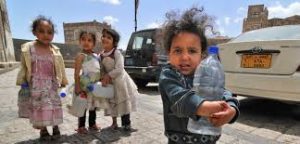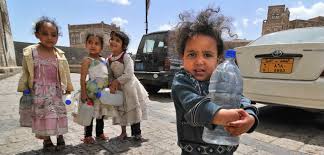 In Yemen, the world’s worst cholera outbreak is unfolding amid the world’s largest humanitarian crisis, crippling health, water and sanitation facilities in the country, and creating ideal conditions for diseases to spread, according to the heads of three United Nations agencies, who pointed out that nearly 80 per cent of Yemen’s children need immediate humanitarian assistance.
In Yemen, the world’s worst cholera outbreak is unfolding amid the world’s largest humanitarian crisis, crippling health, water and sanitation facilities in the country, and creating ideal conditions for diseases to spread, according to the heads of three United Nations agencies, who pointed out that nearly 80 per cent of Yemen’s children need immediate humanitarian assistance.
“The country is on the brink of famine, with over 60 per cent of the population not knowing where their next meal will come from,” said UN Children’s Fund (UNICEF) Executive Director Anthony Lake, World Food Program (WFP) Executive Director David Beasley and World Health Organization (WHO) Director-General Tedros Adhanom Ghebreyesus, the UN news center said in a press release.
The three agency chiefs, who visited together the crisis-torn nation, pointed out that nearly two million Yemeni children are acutely malnourished, and “malnutrition makes them more susceptible to cholera; diseases create more malnutrition […] a vicious combination.”
The UN officials, who witnessed on the spot the scale of the humanitarian crisis, observed that over the last three months, 400,000 cases of suspected cholera and nearly 1,900.
They recalled that more than 1,000 diarrhoea treatment centers and oral rehydration corners have been set up and that the delivery of food supplements and medical supplies is ongoing.
The rebuilding of infrastructure, including hospitals, health centers and the water- sanitation network is also ongoing.
“We are working with the World Bank in an innovative partnership that responds to needs on the ground and helps maintain the local health institutions,” the UN agencies’ heads said.
Drawing attention to their meeting with Yemeni leaders in Aden and Sana’a, the UN officials pressed for humanitarian access to fighting-affected areas and urged for a peaceful political solution.
“We now call on the international community to redouble its support for the people of Yemen. If we fail to do so, the catastrophe we have seen unfolding before our eyes will not only continue to claim lives but will scar future generations and the country for years to come,” concluded the UN heads.
